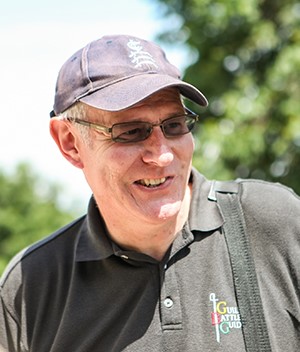"Soldiers and Sportsmen All" - The Great War Story of the 24th Battalion, The Royal Fusiliers by Dr Robert Wynn Jones
01/06/2022 - 2.57
Book Review by Steve Hunnisett
-400x625.jpg)
Bob Jones is a retired professional geologist and palaeontologist, as well as being a keen amateur historian specialising in all things connected with the history of the City of London. He runs an excellent website and blog - www.lostcityoflondon.co.uk. So this interesting account of the 24th (2nd Sportsmen’s) Battalion, The Royal Fusiliers, is a definite step in a new direction for this author.
Dr Jones explains in his dedication that he had a family interest in writing this book; his maternal grandfather, Private Charles Reuben Clements, served in the battalion until he suffered serious wounds at the Battle of Havrincourt on 12 September 1918 and spent the remainder of the war in hospitals in the United Kingdom, before returning to civilian life in 1919.
The Sportsmen’s Battalions were an extension of the idea of the various “Pals” Battalions of Kitchener’s “New Army”, except that these men were not work or professional colleagues but instead were bound together by their love and proficiency at the chosen sports. These Sportsmen’s Battalions were the brainchild of Emma Pauline Cunliffe-Owen, a remarkable woman of mixed Anglo-German parentage, who reputedly met two big-game hunters in London shortly after the outbreak of war and jokingly asked them why they had not enlisted. When they asked her in reply why she had not raised her own battalion, the idea stuck!
The 23rd (1st Sportsmen’s) Battalion had been raised in September 1914 and had quickly become over-subscribed, leading to the formation of the 24th (2nd Sportsmen’s) Battalion during the following November. As the Battalion’s title suggests, the vast majority of the recruits came from a sporting background, or could at least shoot or ride.
The author explains there were three professional footballers amongst the recruits – Serjeant Adams of Southend United and Fulham, Serjeant Arthur Evans of Manchester City, Blackpool and Exeter City and Private Henry George Purver of Brentford – the latter two of whom were killed at Delville Wood on 31st July 1916. Another of the recruits was Charles Percy “Charlie” McGahey, one of Wisden’s “Cricketers of the Year” in 1901, who played for Essex as well as representing MCC in two test matches in Australia in 1901-02. In common with many of his contemporaries, McGahey was also an excellent footballer who appeared for Millwall, Woolwich Arsenal and Spurs.
We hear of the Battalion’s training regime, of their involvement during the various battles and campaigns of the war on a year-by-year basis and learn of the casualties inflicted upon the Battalion at each of the battles they were involved in.
The author has managed to glean many photographs of the personnel involved in the narrative and finishes the book with some useful appendices, in which we can read many biographical sketches of the various men who served with the Battalion, as well as a separate appendix that tells us something of the life of Charles Reuben “Charlie” Clements, the author’s maternal grandfather. He was another accomplished footballer – this time at club level – for Ealing Wednesday, a team formed largely of shopworkers, who preferred to play on their early closing day rather than on Saturday, so as not to lose their best day’s takings.
As one would expect when considering the author’s background, this is a meticulously researched and nicely written book that manages to combine the wider history of the Battalion with some family history. I have no hesitation in commending it to you.
The book is available to buy direct via the author’s website as detailed above. It is published by www.publishnation.co.uk (£8.99, softback, 296 pages).
Biography
Steve is now a full time Battlefield Guide, military history blogger and researcher, specialising in the Home Front and London at war in particular, who took the plunge into self-employment in 2015. He is a Southeast London boy by birth and splits his football watching time between Charlton Athletic and Dulwich Hamlet FC, being a season ticket holder at both clubs. He has developed a great interest in the history and heritage of both these community-oriented clubs and is the author of ‘For Freedom’, which tells the story of Dulwich Hamlet’s Second World War casualties.



/prod01/wlvacuk/media/departments/digital-content-and-communications/images-2024/240328-Varsity-Line-Up-Resized.jpg)
/prod01/wlvacuk/media/departments/digital-content-and-communications/images-18-19/220325-Engineers_teach_thumbail.jpg)
/prod01/wlvacuk/media/departments/digital-content-and-communications/images-2024/240515-Spencer-Jones-Award-Resized.jpg)
/prod01/wlvacuk/media/departments/digital-content-and-communications/images-2024/240320-Uzbekistan-Resized.jpg)
/prod01/wlvacuk/media/departments/digital-content-and-communications/images-2024/240229-The-Link-Resized.jpg)
/prod01/wlvacuk/media/departments/digital-content-and-communications/images-2024/240516-Andy-Gibson-Resized.jpg)